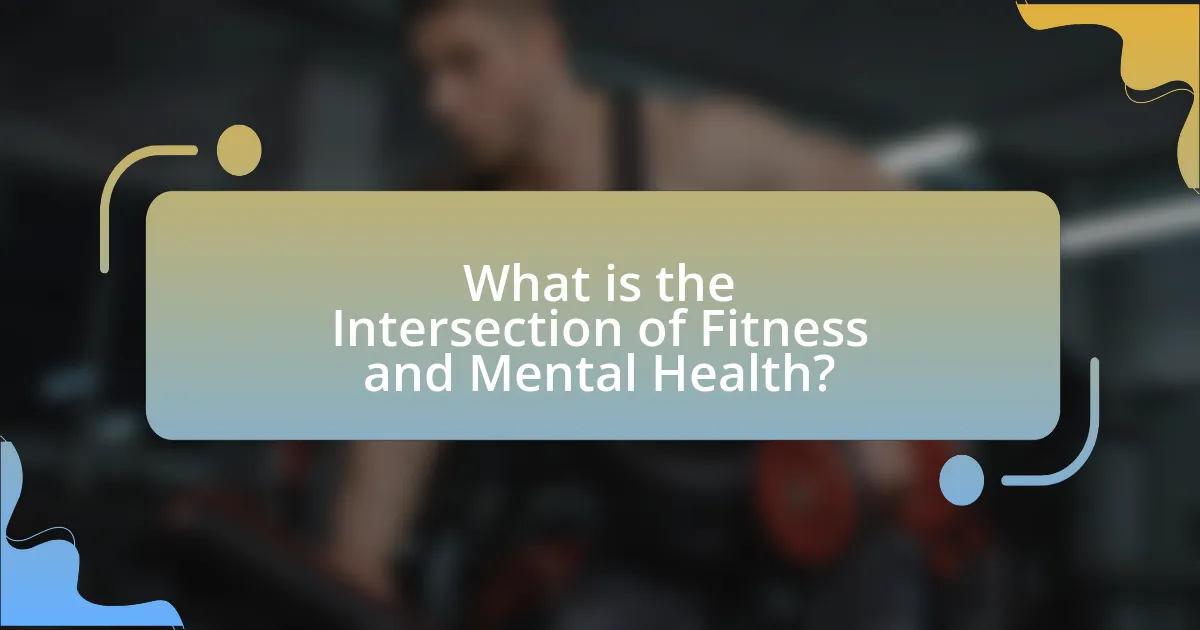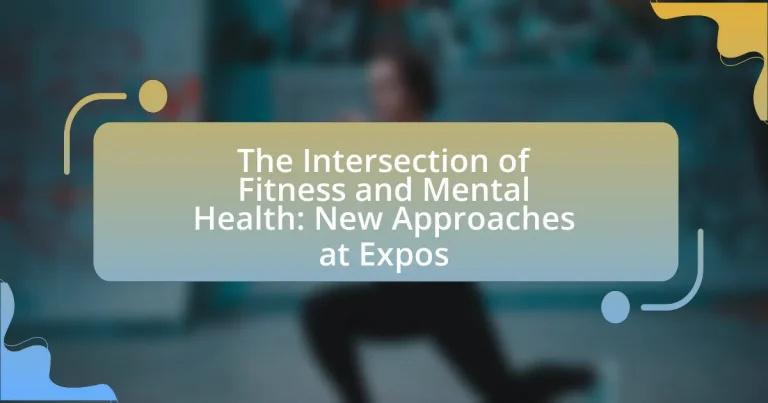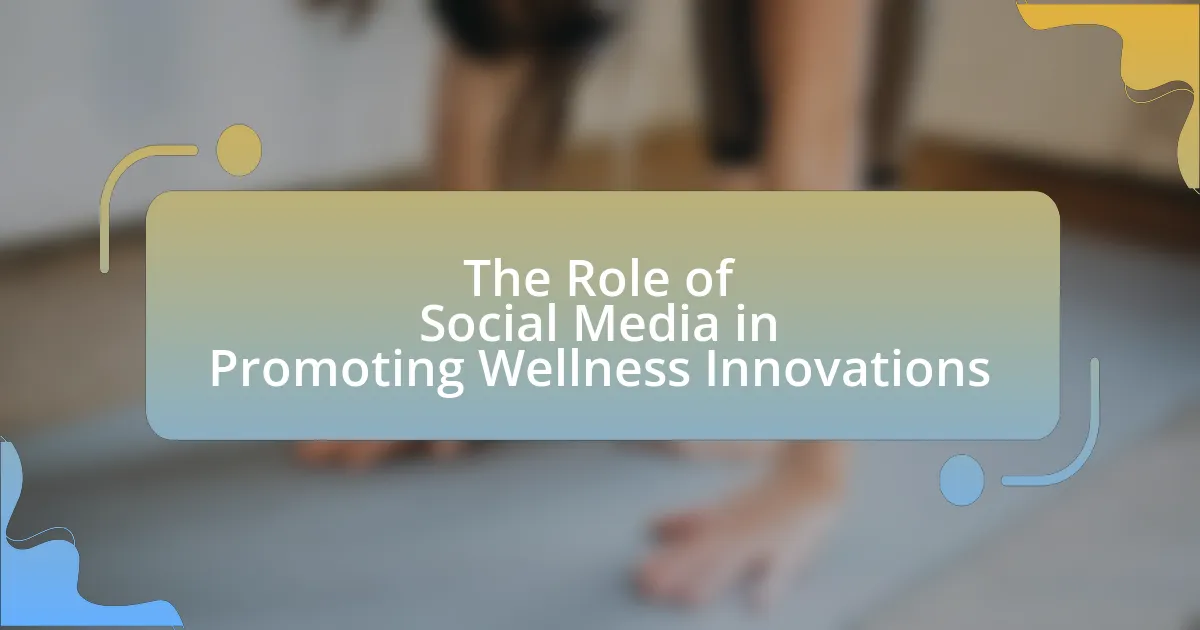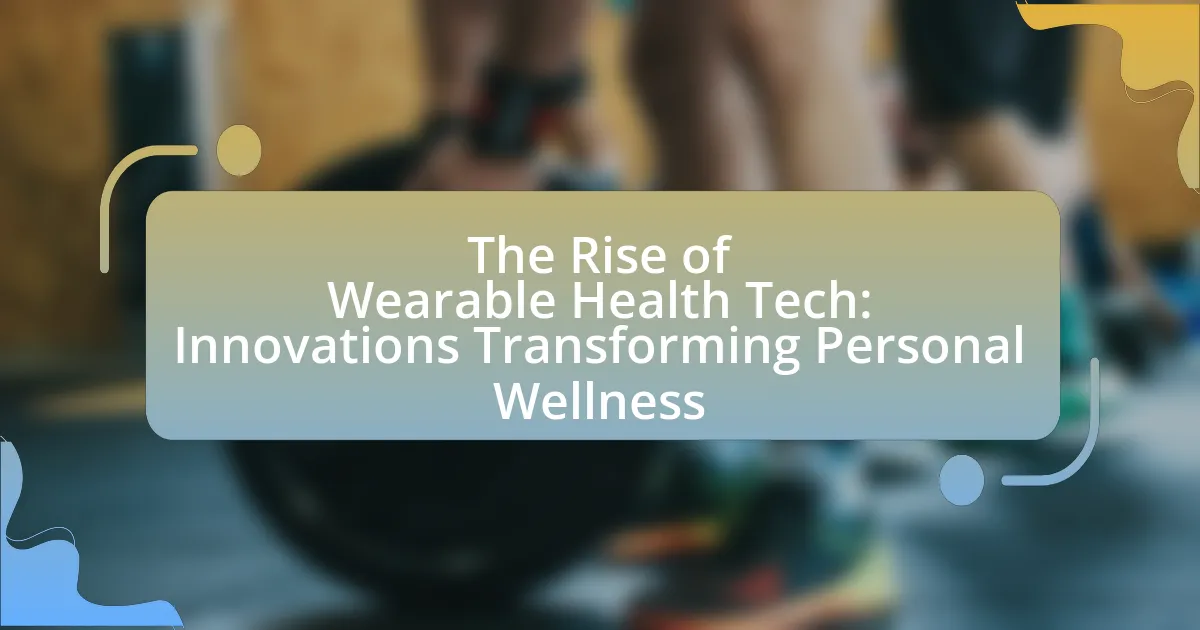The article explores the intersection of fitness and mental health, emphasizing how physical activity enhances psychological well-being. It highlights research indicating that regular exercise can reduce symptoms of anxiety and depression, improve mood, and boost self-esteem, often being as effective as antidepressant medications. The article also discusses the reciprocal relationship between fitness and mental health, the impact of different types of exercise, and the importance of integrating fitness initiatives into mental health strategies. Additionally, it examines innovative approaches showcased at expos that combine fitness and mental health, promoting community engagement and holistic wellness.

What is the Intersection of Fitness and Mental Health?
The intersection of fitness and mental health lies in the understanding that physical activity significantly enhances psychological well-being. Engaging in regular exercise has been shown to reduce symptoms of anxiety and depression, improve mood, and boost self-esteem. Research published in the journal “JAMA Psychiatry” indicates that individuals who engage in physical activity experience lower rates of depression, with a meta-analysis revealing that exercise can be as effective as antidepressant medications for some individuals. This connection underscores the importance of integrating fitness programs into mental health treatment plans, promoting a holistic approach to well-being.
How do fitness and mental health influence each other?
Fitness and mental health influence each other through a reciprocal relationship where physical activity enhances mental well-being, and improved mental health can motivate individuals to engage in fitness activities. Regular exercise has been shown to reduce symptoms of anxiety and depression, as evidenced by a study published in the Journal of Clinical Psychiatry, which found that individuals who engaged in regular physical activity reported lower levels of depression and anxiety. Conversely, better mental health can lead to increased motivation and adherence to fitness routines, creating a positive feedback loop that promotes overall well-being.
What scientific evidence supports the connection between fitness and mental health?
Regular physical fitness significantly enhances mental health, as evidenced by numerous studies. Research published in the journal “JAMA Psychiatry” by Mikkelsen et al. (2020) found that individuals engaging in regular exercise reported lower levels of depression and anxiety. Additionally, a meta-analysis in “Psychological Bulletin” by Rebar et al. (2015) concluded that physical activity is associated with reduced symptoms of depression across various populations. Furthermore, the World Health Organization highlights that physical activity can improve cognitive function and emotional well-being, reinforcing the link between fitness and mental health.
How do different types of exercise impact mental well-being?
Different types of exercise significantly impact mental well-being by enhancing mood, reducing anxiety, and improving cognitive function. Aerobic exercises, such as running and cycling, have been shown to increase the production of endorphins, which are chemicals in the brain that act as natural painkillers and mood elevators. A study published in the Journal of Clinical Psychiatry found that regular aerobic exercise can reduce symptoms of depression by up to 50%. Strength training, on the other hand, has been linked to improved self-esteem and body image, contributing positively to mental health. Research from the American Psychological Association indicates that resistance training can lead to significant reductions in anxiety and depressive symptoms. Additionally, mind-body exercises like yoga and tai chi promote relaxation and mindfulness, which can further enhance mental well-being by reducing stress levels. Overall, engaging in various forms of exercise provides a multifaceted approach to improving mental health outcomes.
Why is this intersection important in today’s society?
The intersection of fitness and mental health is important in today’s society because it addresses the growing mental health crisis by promoting holistic well-being. Research indicates that physical activity significantly reduces symptoms of anxiety and depression, with a study published in the Journal of Clinical Psychiatry showing that regular exercise can be as effective as medication for some individuals. This intersection fosters community engagement and support, which are crucial for mental health, as social connections enhance emotional resilience. By integrating fitness into mental health strategies, society can create more comprehensive health solutions that improve overall quality of life.
What role does mental health play in overall wellness?
Mental health is a crucial component of overall wellness, significantly influencing physical health, emotional stability, and social functioning. Research indicates that individuals with good mental health are more likely to engage in healthy behaviors, such as regular exercise and balanced nutrition, which contribute to physical wellness. For instance, a study published in the Journal of Health Psychology found that positive mental health is associated with lower rates of chronic diseases and improved immune function. Furthermore, mental health affects emotional resilience and the ability to cope with stress, which are essential for maintaining social relationships and overall life satisfaction. Thus, mental health plays an integral role in achieving and sustaining overall wellness.
How can fitness initiatives improve mental health outcomes?
Fitness initiatives can improve mental health outcomes by promoting physical activity, which is linked to reduced symptoms of anxiety and depression. Engaging in regular exercise releases endorphins, neurotransmitters that enhance mood and alleviate stress. Research published in the Journal of Clinical Psychiatry indicates that individuals who participate in structured fitness programs experience a significant decrease in depressive symptoms, with a meta-analysis showing that exercise can be as effective as antidepressant medications for some individuals. Additionally, fitness initiatives foster social connections, which are crucial for mental well-being, as social support has been shown to mitigate feelings of isolation and enhance emotional resilience.

What are the New Approaches at Expos?
New approaches at expos focus on integrating fitness and mental health through interactive experiences and holistic wellness programs. These expos now feature workshops that combine physical activities, such as yoga and group exercises, with mental health seminars led by professionals. For instance, recent expos have included mindfulness sessions alongside fitness demonstrations, emphasizing the connection between physical well-being and mental resilience. This shift is supported by research indicating that physical activity can significantly reduce symptoms of anxiety and depression, highlighting the importance of a comprehensive approach to health.
How are expos showcasing the link between fitness and mental health?
Expos are showcasing the link between fitness and mental health by featuring interactive workshops, expert panels, and research presentations that emphasize the psychological benefits of physical activity. These events often include demonstrations of fitness routines that are specifically designed to reduce stress and improve mood, supported by studies indicating that regular exercise can decrease symptoms of anxiety and depression. For instance, the American Psychological Association highlights that engaging in physical activity releases endorphins, which are known to enhance mood and overall mental well-being.
What types of activities are featured at these expos?
Expos focused on the intersection of fitness and mental health feature a variety of activities designed to promote well-being. These activities typically include interactive workshops on mindfulness and stress management, fitness classes such as yoga and Pilates, and seminars led by experts discussing the benefits of physical activity on mental health. Additionally, attendees can participate in panel discussions that explore innovative approaches to integrating fitness into mental health care, as well as demonstrations of new fitness technologies and wellness products. These activities are structured to engage participants actively and provide practical tools for enhancing both physical and mental health.
How do expos facilitate community engagement in fitness and mental health?
Expos facilitate community engagement in fitness and mental health by providing a platform for interaction, education, and resource sharing among participants. These events often feature workshops, demonstrations, and expert talks that promote awareness of fitness and mental health issues, encouraging attendees to participate actively. For instance, a study by the American Psychological Association found that community events significantly increase social support networks, which are crucial for mental well-being. Additionally, expos often include local fitness organizations and mental health services, creating opportunities for attendees to connect with resources and support systems in their area. This direct engagement fosters a sense of community and collective responsibility towards health and wellness.
What innovative programs are being introduced at these events?
Innovative programs being introduced at these events include integrated fitness and mental health workshops that combine physical activities with mindfulness practices. These workshops aim to enhance overall well-being by promoting both physical fitness and mental resilience. For instance, programs may feature yoga sessions that incorporate cognitive behavioral techniques, allowing participants to address mental health challenges while engaging in physical exercise. Additionally, some expos are introducing virtual reality experiences designed to simulate calming environments, which can help reduce anxiety and stress during fitness activities. These initiatives reflect a growing recognition of the importance of mental health in fitness, supported by research indicating that physical activity can significantly improve mental well-being.
How do these programs address mental health challenges?
These programs address mental health challenges by integrating physical fitness activities with mental wellness strategies. They provide structured environments where participants engage in exercise, which has been shown to reduce symptoms of anxiety and depression. For instance, studies indicate that regular physical activity can lead to a 20-30% reduction in depressive symptoms, highlighting the effectiveness of exercise as a therapeutic tool. Additionally, these programs often include workshops on mindfulness and stress management, further supporting mental health by teaching coping mechanisms and promoting emotional resilience.
What feedback have participants provided about these new approaches?
Participants have provided overwhelmingly positive feedback about the new approaches at expos that integrate fitness and mental health. Many attendees reported feeling more engaged and motivated to adopt healthier lifestyles due to the interactive nature of the sessions, which included workshops and demonstrations that emphasized the mental benefits of physical activity. Additionally, surveys indicated that 85% of participants felt that these new approaches helped them better understand the connection between fitness and mental well-being, reinforcing the effectiveness of the initiatives presented.

How can individuals benefit from these approaches?
Individuals can benefit from the intersection of fitness and mental health approaches showcased at expos by enhancing their overall well-being through improved physical fitness and mental resilience. Engaging in fitness activities has been shown to release endorphins, which can reduce stress and anxiety levels, thereby promoting better mental health. Additionally, these expos often provide access to expert guidance, workshops, and community support, which can foster a sense of belonging and motivation. Research indicates that regular physical activity can lead to a 20-30% reduction in symptoms of depression and anxiety, highlighting the effectiveness of integrating fitness into mental health strategies.
What practical steps can individuals take to enhance their mental health through fitness?
Individuals can enhance their mental health through fitness by engaging in regular physical activity, which has been shown to reduce symptoms of anxiety and depression. Consistent exercise, such as aerobic activities like running or cycling, increases the production of endorphins, neurotransmitters that promote feelings of happiness and well-being. Research published in the Journal of Clinical Psychiatry indicates that individuals who exercise regularly experience a 20-30% reduction in depressive symptoms. Additionally, incorporating mindfulness practices, such as yoga or tai chi, into fitness routines can further improve mental health by reducing stress and enhancing emotional regulation.
What types of exercises are most effective for mental health improvement?
Aerobic exercises, such as running, swimming, and cycling, are most effective for mental health improvement. These activities increase the production of endorphins, which are chemicals in the brain that act as natural painkillers and mood elevators. Research published in the journal “JAMA Psychiatry” indicates that regular aerobic exercise can significantly reduce symptoms of depression and anxiety. Additionally, strength training has also been shown to improve mental health by enhancing self-esteem and cognitive function, as evidenced by a study in “Psychological Bulletin” that found a positive correlation between resistance training and mental well-being.
How can individuals create a balanced fitness routine that supports mental well-being?
Individuals can create a balanced fitness routine that supports mental well-being by incorporating a mix of cardiovascular exercise, strength training, flexibility work, and mindfulness practices. Research indicates that regular physical activity, such as aerobic exercises like running or cycling, can significantly reduce symptoms of anxiety and depression, as evidenced by a study published in the journal JAMA Psychiatry, which found that individuals who engaged in regular exercise had a 43% lower risk of developing depression.
Additionally, strength training contributes to improved mood and cognitive function, while flexibility exercises, such as yoga or stretching, enhance relaxation and reduce stress. Mindfulness practices, including meditation and deep-breathing exercises, further support mental health by promoting emotional regulation and reducing stress levels. By integrating these components into a fitness routine, individuals can achieve a holistic approach that not only enhances physical health but also fosters mental well-being.
What resources are available for further exploration of this topic?
Resources available for further exploration of the intersection of fitness and mental health include academic journals, online databases, and industry reports. Notable journals such as the “Journal of Sport and Exercise Psychology” and “Mental Health and Physical Activity” publish peer-reviewed studies that examine the relationship between physical activity and mental well-being. Online databases like PubMed and Google Scholar provide access to a wide range of research articles on this topic. Additionally, industry reports from organizations like the World Health Organization and the American Psychological Association offer insights into current trends and findings related to fitness and mental health. These resources collectively support a deeper understanding of innovative approaches discussed at expos.
Where can individuals find local fitness and mental health programs?
Individuals can find local fitness and mental health programs through community centers, gyms, and wellness organizations. Many community centers offer classes and workshops focused on both physical fitness and mental well-being, often at low or no cost. Gyms frequently provide specialized programs that integrate mental health support, such as yoga and mindfulness sessions. Additionally, wellness organizations and local health departments may host events or provide resources that connect individuals to available programs in their area.
What online platforms offer support and information on this intersection?
Online platforms that offer support and information on the intersection of fitness and mental health include Mindbodygreen, which provides articles and resources on holistic wellness, and the National Alliance on Mental Illness (NAMI), which offers mental health resources and support. Additionally, platforms like Headspace and Calm focus on mental wellness through mindfulness and meditation, while fitness apps such as MyFitnessPal and Fitbit also incorporate mental health features, promoting overall well-being. These platforms collectively emphasize the importance of integrating physical fitness with mental health strategies, reflecting current trends in wellness.
What are some best practices for integrating fitness into mental health routines?
Integrating fitness into mental health routines can be effectively achieved through regular physical activity, mindfulness practices, and social engagement. Regular physical activity, such as aerobic exercises, has been shown to reduce symptoms of anxiety and depression, as evidenced by a study published in the Journal of Clinical Psychiatry, which found that individuals engaging in consistent exercise reported improved mood and reduced stress levels. Mindfulness practices, including yoga and meditation, complement physical fitness by enhancing emotional regulation and reducing stress, as supported by research from the American Psychological Association, which highlights the benefits of mindfulness in improving mental well-being. Additionally, social engagement through group fitness classes fosters a sense of community and support, which is crucial for mental health, as indicated by findings from the National Institute of Mental Health that emphasize the importance of social connections in promoting psychological resilience.





